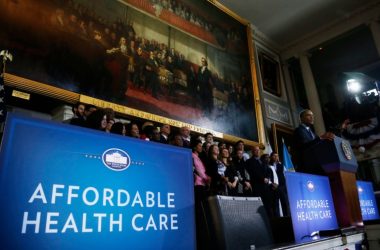Senate Republicans are waving former President Trump away from making another foray into health care reform, fearing he might repeat the mistakes he made in 2017 by getting sucked into another messy and unsuccessful fight over ObamaCare.
GOP lawmakers say Trump should focus instead on extending the tax cuts he signed into law at the end of 2017, which are due to expire at the end of next year.
They warn that the Affordable Care Act (ACA), which badly divided their party when Trump tried to repeal it, has become engrained in the fabric of the nation’s health care system, as more than 21 million Americans select health plans through the act’s Health Insurance Marketplace.
Trump declared at the Sept. 10 presidential debate that “ObamaCare was lousy health care” and pledged “we’re going to replace it” if he wins in November. He added he would “only change it if we come up with something better and less expensive.”
But Republican senators see the health care debate as filled with political land mines, and they’re eager to avoid a reprise of the failure to replace the Affordable Care Act seven years ago, when three GOP senators voted with Democrats to defeat an effort to repeal major pieces of that landmark law.
Two of the Republicans who defied Trump — Sens. Susan Collins (Maine) and Lisa Murkowski (Alaska) — are still in the Senate. The third, then-Sen. John McCain (Ariz.), died in 2018.
“I never hear a lot of Republican candidates saying we’re going to repeal and replace the ACA. Those are from campaigns gone by,” Murkowski told The Hill.
She said fellow Republicans who are urging Trump to focus on extending the 2017 Tax Cuts and Jobs Act instead of wading into another health care quagmire are offering “sound advice.”
“I think we’re teeing ourselves up for the big tax discussions at the beginning of this next Congress. That’s what I see happening, not health care,” she said.
Sen. Kevin Cramer (R-N.D.), a Trump ally who was serving in the House the last time Republicans debated major health care reform, said Trump would be wise to focus on the economy and tax cuts if he wins in November.
Cramer said he believes Trump wants to work “within” the framework of the ACA instead of ripping it out “root and branch,” as Republicans pledged to do a decade ago.
“We need to take the situation as it is and work on concepts … like high-risk pools and giving states more direct money to deal with Medicaid,” he said.
But he said the issue should be put on the back burner for now, and Congress should focus on tax reform in 2025 if Republicans control the White House and both branches of Congress.
“I think tax relief. It’s got to be tax policy,” Cramer said. “I just wouldn’t tackle [health care] as an overhaul or a repeal of ObamaCare. We do have to improve and make permanent the Tax Cuts and Jobs Act.”
Senate Republican Leader Mitch McConnell (Ky.), who helped lead the push to repeal the ACA during Trump’s first year in office, said earlier this year that battle is “largely over.”
“We had a fight over that a few years ago,” McConnell said in March in response to a Trump statement that he was “seriously looking at alternatives” to ObamaCare if he is elected to a second term.
“If he can develop a base for revisiting that issue, obviously we’d take a look at it, but it seems to me that’s largely over,” McConnell told reporters when asked about Trump’s health care plans.
Sen. James Lankford (R-Okla.), a member of the Finance Committee, which has jurisdiction over many health care-related issues, acknowledged that the ACA has become interwoven with the nation’s health system and couldn’t be “turned off” simply.
“It’s been health care now for more than a decade, and every business has reconfigured. Independent doctors are gone. They all work for major hospitals now. Labs have been closed down because ObamaCare shut all those down. So it’s not just as easy as turning off and turning on anymore. It’s well-established,” he said.
Sen. JD Vance (R-Ohio), Trump’s running mate, offered more details in a recent interview with NBC’s “Meet the Press” about what health care reforms Trump might pursue if elected to a second term.
He floated the idea of creating high-risk pools to segregate individuals in poorer health who tend to be subsidized by the premiums paid by younger and healthier consumers.
“You want to make sure that people have access to the doctors that they need, and you also want to implement some deregulatory agenda so that people can choose a health care plan that fits them,” he said.
“Think about it: A young American doesn’t have the same health care needs as a 65-year old American. A 65-year-old American in good health has much different needs than a 65-year-old American with a chronic condition,” Vance said.
Vance argued that the “best way” to reform the system would be to promote greater choice of plans and “not have a one-size-fits-all approach that puts a lot of people into the same insurance pools, the same risk pools.”
His comments describe a concept Republicans debated in 2017 but that policy experts warned would lead to insurance costs spiraling out of control for sicker individuals placed in the high-risk pools.
KFF, an independent health policy research and polling organization, noted in a recent analysis that only 5 percent of the population with the highest health costs account for about half of total health spending and predicted that removing them from bigger insurance pools would likely cause their insurance premiums to rise “significantly” without big increases in government subsidies.
“High-risk pools could theoretically protect people with pre-existing conditions but only with sufficient government funding, which they’ve never had,” Cynthia Cox, director of KFF’s Program on the ACA, wrote in the analysis.
The Commonwealth Fund estimated in 2017 that if the nation’s uninsured patients with preexisting conditions — more than 15 million at the time — were put into a national high-risk pool, the net federal cost to insure them would be $178 billion annually.
Senate Republican Whip John Thune (S.D.), a leading candidate to be Senate majority leader if Republicans win control of the Senate in November, said extending the Trump tax cuts has to be the top priority but left the door open to including health care reform in a budget reconciliation package next year.
“Tax reform’s got the deadline associated with it. I mean, we have next year to get it done. In ’25 all this stuff expires, including all the individual [tax bracket] stuff, so it’s got to be a big priority. Could a reconciliation bill, if we have all three [control of the White House, Senate and House], accommodate some health care policy? Yeah, probably,” Thune said.





